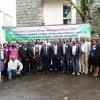The International Training Course on Planning and Management of Malaria Control Programs for Anglophone African Countries launched in Addis Ababa
03 September 2012, EHNRI, Addis Ababa -- The Third Round of the International Training Course on Planning and Management of Malaria Control Programs for Anglophone African Countries is underway, launched on the 3rd of September 2012, at Ethiopian Health and Nutrition Research Institute (EHNRI) in Addis Ababa. In attendance were Dr. Amha Kebede, Acting Director General of the EHNRI, Dr. Khaled Bessaoud, Acting WHO Representative to Ethiopia and Dr. Basimike Mulenda, WHO/AFRO Focal point for malaria capacity development.
The training brought together 37 participants from 13 African countries all working on malaria control in their respective countries. The WHO African Region undertakes similar training program in Benin for Francophone Africa Countries.
The training is co-organized by the World Health Organization Africa Regional Office (WHO/AFRO) in collaboration with WHO/Ethiopia, the Federal Ministry of Health – Ethiopia and the EHNRI. This International training course is the third of a series of capacity enhancement taking place in Ethiopia. It aims at overcoming the lack of human resources needed to take countries into malaria pre elimination and elimination efforts in endemic African countries.
In his key note address at the launch of the event, Dr. Khaled Bessaoud, said, “Malaria is a public health problem, globally, regionally in Africa and particularly in Sub Saharan Africa. It is one of the most main causes of morbidity and mortality in Africa. According to World malaria Report of 2011 (WM 2011), 81% of the global cases and 91% of the global deaths were reported in the WHO African region. This justifies the central place given to the fight against Malaria in the WHO African Region, the unprecedented partnership and resource mobilization and the highest possible leadership mobilization for the elimination of the disease. As a matter of fact, the fight against Malaria was on the Agenda of African Leaders against Malaria Alliance (ALMA) who met recently in Addis Ababa, at the margins of the last African Union Summit.”
Underscoring the importance of the training it plays in sustaining countries’ ability to manage control efforts, he said, “Capacity building, through training, holds a central place in the prevention and control of Malaria and Ethiopia has been playing a key role in building the capacity of African professionals since 1992.” On the post training expectations, he reminded participants, “The training should not be an end in itself. It should be a means of building the necessary capacity that enables to provide meaningful contribution. This training should have a multiplier effect; it should equip the participants with the necessary skills to help you cascade training activities for service providers in your respective countries. ” Dr. Khaled Bessaoud emphasized also the need to develop trainees networking within and across countries to encourage professionals for experience sharing and mobilize support when needed.
In delivering his opening remarks, Dr Amha Kebede, gave a brief historical overview of malaria prevention and control in Ethiopia, the challenges over years since the 1960, when the motto was on Malaria Eradication to the current level of progress in the pre elimination and elimination strategic direction. On the promising prospects of malaria elimination, he said, “Looking into the effectiveness and efficiency of malaria interventions - the reduction of the disease burden observed and the strategies now made accessible to countries, leading to acceleration of malaria control, pre elimination interventions are paving the way to eliminate malaria from our continent”. He highlighted also the role that this training will contribute to achieve malaria pre elimination and elimination in Africa.
Dr. Basimike Mulenda, who is instrumental in the organization and facilitation of the training, provided global and regional background of malaria situations, its impacts and the progress made in the region in terms of reduction of morbidity and mortality due to malaria. He said, “Worldwide malaria affects in 106 countries and many of the affected people are living in endemic countries of Africa. An estimated 566,000 deaths occur in Africa. This is a substantial reduction from previous years. This progress has been made possible as result of the introduction of effective interventions including the drugs such as Artemisinin combined therapy (ACTs), the distribution of Long Lasting Insecticide-Treated Nets (LLITNs) in various countries at large scale to cover more populations. Ethiopia alone distributed more than 10 million in 2011. In addition to case management and prevention of malaria transmission, capacity building efforts have largely contributed to the good application of these interventions. The combined effects of these interventions are the main reason for the decline of malaria globally.”
Six modules will be taught during this six weeks long training course on planning and managing malaria control programs. The teaching methodology of the modules will be through plenary sessions combined with case studies in health facilities. Field visits will be carried out at health facilities and community level. Participants will also visit the Nazareth Malaria Training Centre in Oromyia Region where participants will learn about indoor spraying techniques (IRS) and acquire knowledge of mosquito dissections for parasite search.
For furter information
Email: who-wro [at] et.afro.who.int
Country Ethiopia Office Website: http://www.who.int/countries/eth/
P.O. Box: 3069; Fax: +251115514037; Phone: +2511155347







